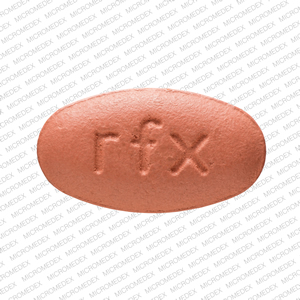Rifaximin
Generic name: rifaximin [ rif-AX-i-min ]
Brand name: Xifaxan
Dosage form: oral tablet (200 mg; 550 mg)
Drug class: Miscellaneous antibiotics
What is rifaximin?
Rifaximin is used to treat travelers' diarrhea caused by Escherichia coli (E. coli) in adults and children who are at least 12 years old. Most people get this infection by eating food or drinking fluids that have been contaminated with the E. coli bacteria.
Rifaximin is also used to treat irritable bowel syndrome (IBS) in adults whose main symptom is diarrhea.
Rifaximin is also used to lower the risk of a decline in brain function in adults with liver failure. Brain function can be affected when the liver stops working and cannot remove toxic substances from the body.
Rifaximin may also be used for purposes not listed in this medication guide.
Rifaximin side effects
Get emergency medical help if you have signs of an allergic reaction: hives; difficult breathing; swelling of your face, lips, tongue, or throat.
Rifaximin may cause serious side effects. Call your doctor at once if you have:
-
severe stomach pain, diarrhea that is watery or bloody (even if it occurs months after your last dose);
-
fever; or
-
fluid build-up around the stomach--rapid weight gain, stomach pain and bloating, trouble breathing while lying down.
Common side effects of rifaximin may include:
-
swelling in your hands or feet;
-
nausea;
-
headache, dizziness;
-
tiredness; or
-
abnormal liver function tests.
This is not a complete list of side effects and others may occur. Call your doctor for medical advice about side effects. You may report side effects to FDA at 1-800-FDA-1088.
Related/similar drugs
Warnings
Follow all directions on your medicine label and package. Tell each of your healthcare providers about all your medical conditions, allergies, and all medicines you use.
Before taking this medicine
You should not take rifaximin if you are allergic to rifaximin, rifabutin, rifampin, or rifapentine.
Tell your doctor if you have ever had:
-
diarrhea with a fever; or
-
watery or bloody diarrhea.
Tell your doctor if you are pregnant or breastfeeding.
Rifaximin should not be given to a child younger than 12 years old.
How should I take rifaximin?
Follow all directions on your prescription label and read all medication guides or instruction sheets. Use the medicine exactly as directed.
You may take rifaximin with or without food.
For travelers' diarrhea, rifaximin is usually taken for only 3 days. For IBS, rifaximin is usually taken for 2 weeks at a time. Follow your doctor's dosing instructions very carefully.
Use this medicine for the full prescribed length of time, even if your symptoms quickly improve. Skipping doses can increase your risk of infection that is resistant to medication. Rifaximin will not treat a viral infection such as the flu or a common cold.
Do not share this medicine with another person, even if they have the same symptoms you have.
Call your doctor if your symptoms do not improve after 24 to 48 hours, or if they get worse while using rifaximin.
Rifaximin does not treat all bacterial forms of travelers' diarrhea.
Store at room temperature away from moisture and heat.
Rifaximin dosing information
Usual Adult Dose for Traveler's Diarrhea:
200 mg orally 3 times a day for 3 days
Comments:
-This drug should not be used in patients with diarrhea complicated by fever or blood in the stool or diarrhea caused by pathogens other than Escherichia coli.
Use: For the treatment of travelers' diarrhea due to noninvasive strains of E coli
Usual Adult Dose for Hepatic Encephalopathy:
550 mg orally twice a day
Comments:
-In trials, lactulose was used concomitantly in 91% of patients; differences in treatment effect of patients not using concomitant lactulose could not be assessed.
Use: For reduction in risk of overt hepatic encephalopathy recurrence
Usual Adult Dose for Irritable Bowel Syndrome:
550 mg orally 3 times a day for 14 days
Comments:
-If symptoms recur, patients can be retreated up to 2 times with the same dosage regimen.
Use: For the treatment of irritable bowel syndrome with diarrhea
Usual Pediatric Dose for Traveler's Diarrhea:
12 years or older: 200 mg orally 3 times a day for 3 days
Comments:
-This drug should not be used in patients with diarrhea complicated by fever or blood in the stool or diarrhea caused by pathogens other than E coli.
Use: For the treatment of travelers' diarrhea due to noninvasive strains of E coli
What happens if I miss a dose?
Take the medicine as soon as you can, but skip the missed dose if it is almost time for your next dose. Do not take two doses at one time.
What happens if I overdose?
Seek emergency medical attention or call the Poison Help line at 1-800-222-1222.
What should I avoid while taking rifaximin?
Antibiotic medicines can cause diarrhea, which may be a sign of a new infection. If you have diarrhea that is watery or bloody, call your doctor before using anti-diarrhea medicine.
What other drugs will affect rifaximin?
Tell your doctor about all your other medicines, especially:
-
warfarin (Coumadin, Jantoven);
-
an antibiotic--clarithromycin, erythromycin;
-
antiviral medicine--ritonavir, saquinavir; or
-
heart or blood pressure medicine--amiodarone, quinidine, verapamil.
This list is not complete. Other drugs may affect rifaximin, including prescription and over-the-counter medicines, vitamins, and herbal products. Not all possible drug interactions are listed here.
More about rifaximin
- Check interactions
- Compare alternatives
- Reviews (154)
- Side effects
- Dosage information
- During pregnancy
- Drug class: miscellaneous antibiotics
- Breastfeeding
- En español
Patient resources
Other brands
Professional resources
Other brands
Related treatment guides
Further information
Remember, keep this and all other medicines out of the reach of children, never share your medicines with others, and use this medication only for the indication prescribed.
Always consult your healthcare provider to ensure the information displayed on this page applies to your personal circumstances.
Copyright 1996-2025 Cerner Multum, Inc. Version: 6.01.

